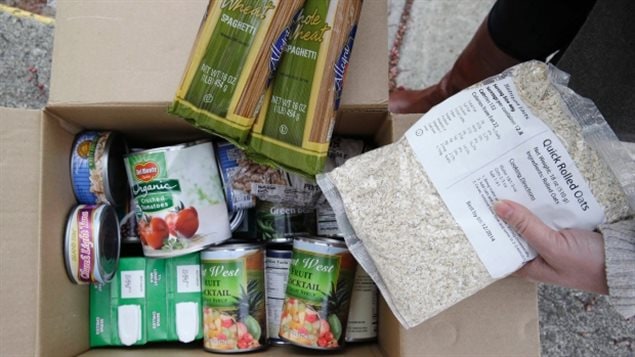More than 840,000 Canadians went to food banks in March to get free groceries. That was one per cent more than sought food aid last year and is a figure described as “alarming” by Katharine Schmidt, executive director of Food Banks Canada. That umbrella organization has just issued its annual HungerCount report, a leading measure of poverty in Canada.
“In a year about 1.8 million different Canadians (access food banks) which is very surprising given that we live in such a prosperous country…
Listen‘A staggering increase’
“We’ve seen a staggering increase since 2008 when the last economic downturn hit. We’ve seen an increase of 25 per cent and unfortunately, that level of people having to come for assistance hasn’t dropped over the last five or six years,” says Schmidt.
Most of those seeking help with food live in rental housing, according to the report. One in seven self-identify as aboriginal. Twelve per cent are immigrants to refugees and that number rises to 20 per cent in larger cities.

‘Significant shift’ in the job market
Twelve per cent of food bank users are employed. The problem is they are not in very good jobs. “We’ve seen a significant shift in our job market,” says Schmidt.
“Over the last 15 to 20 years we’ve lost a lot of high-quality, high-paying jobs in manufacturing, in forestry, in fisheries and while we’re creating new jobs here in Canada, often they are lower paying. They’re often service sector jobs, they’re temporary, they’re part time, and they don’t have the same benefit level. So we’ve got a lot of working Canadians who are struggling to pay rent and buy groceries,” says Schmidt.
Food bank charities ‘struggling’
There are 4,000 food banks in Canada. They are charity organizations that are funded by businesses and individuals and often staffed by volunteers. Coping with 170,000 more people needing help is a challenge says Schmidt, adding that food banks are “struggling.”

‘We need some social policy change’
Food banks can only offer three to five days’ worth of food in a month. “At the end of the day we need some social policy change,” she says. Governments need to invest in affordable housing for the poor, they need to increase the money they provide for social assistance payments to the poor, and there should be more support for skills training and literacy programs so people can get better jobs.
‘What are we going to do as a country’
Canadians need to ask “what are we going to do as a country as prosperous as us to shift this so we’re not seeing as many people live in poverty and not being able to sustain themselves.”







For reasons beyond our control, and for an undetermined period of time, our comment section is now closed. However, our social networks remain open to your contributions.